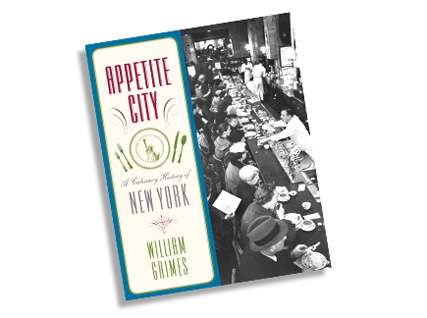The Bookshelf: William Grimes's Favorite New York Restaurants of Yore
jbfauthor
jbfauthorMay 26, 2010
 Many of New York's iconic dining establishments vanished from the pages of Zagat long ago, but there are some that William Grimes, former New York Times restaurant critic and author of Appetite City, told us he would love to eat in if he had a time machine. Here's a stroll down memory lane:
Clark and Brown’s Chophouse
Water Street, circa 1830
“One of the earliest and most famous examples of a restaurant style that, along with the oyster cellar (see below), defined New York dining. Mutton chops were the big thing, thick, juicy, and bordered with a nice stripe of fat. Bread toasted over the open fire with a fork was the usual accompaniment, along with English ale.”
Dorlon’s
Fulton Market, circa 1870
“Just finding Dorlon’s, the city’s premier oyster house, required a search through the maze of Fulton Market, which means that I would get to see the glorious display of meat, fish, fruit, and vegetables on offer to New Yorkers more than a century ago. At Dorlon’s, I could finally get to taste the long-gone oysters of yesteryear: Saddle Rocks, Shrewsburies, Prince’s Bays, and the rest of their legendary company.”
Dolan’s
Park Row, circa 1890
“Dolan’s was in the heart of the city’s teeming publishing industry, surrounded by newspaper buildings and magazine headquarters. For a dime you got “beef and” or “ham and”—a slice of meat and a side order of beans. This simple meal fed cub reporters, newsboys, press tycoons, and famous writers, all thrown together by the great democracy of print journalism.”
Murray’s Roman Gardens
Times Square, circa 1912
“Soon after the turn of the century, Times Square developed into a vibrant district of terrific restaurants known as lobster palaces. The wildest of these Vegas-style eateries was Murray’s, the city’s first theme restaurant, with a decor that suggested several Cecil B. DeMille epics rolled into one. Roman, Assyrian, and Egyptian motifs mingled with Japanese and Chinese elements. It was one of a kind, and never duplicated.”
Le Restaurant Français
1939 World’s Fair
“This was the restaurant that became Le Pavillon, the benchmark for fine French food in Manhattan for a generation. I would like to see it when it started, at the Fair, and experience that magic moment when the best that Paris had to offer was packaged and shipped, via luxury liner, to eager Americans desperate for a taste thrill after the hard years of Prohibition and the Depression.”
Many of New York's iconic dining establishments vanished from the pages of Zagat long ago, but there are some that William Grimes, former New York Times restaurant critic and author of Appetite City, told us he would love to eat in if he had a time machine. Here's a stroll down memory lane:
Clark and Brown’s Chophouse
Water Street, circa 1830
“One of the earliest and most famous examples of a restaurant style that, along with the oyster cellar (see below), defined New York dining. Mutton chops were the big thing, thick, juicy, and bordered with a nice stripe of fat. Bread toasted over the open fire with a fork was the usual accompaniment, along with English ale.”
Dorlon’s
Fulton Market, circa 1870
“Just finding Dorlon’s, the city’s premier oyster house, required a search through the maze of Fulton Market, which means that I would get to see the glorious display of meat, fish, fruit, and vegetables on offer to New Yorkers more than a century ago. At Dorlon’s, I could finally get to taste the long-gone oysters of yesteryear: Saddle Rocks, Shrewsburies, Prince’s Bays, and the rest of their legendary company.”
Dolan’s
Park Row, circa 1890
“Dolan’s was in the heart of the city’s teeming publishing industry, surrounded by newspaper buildings and magazine headquarters. For a dime you got “beef and” or “ham and”—a slice of meat and a side order of beans. This simple meal fed cub reporters, newsboys, press tycoons, and famous writers, all thrown together by the great democracy of print journalism.”
Murray’s Roman Gardens
Times Square, circa 1912
“Soon after the turn of the century, Times Square developed into a vibrant district of terrific restaurants known as lobster palaces. The wildest of these Vegas-style eateries was Murray’s, the city’s first theme restaurant, with a decor that suggested several Cecil B. DeMille epics rolled into one. Roman, Assyrian, and Egyptian motifs mingled with Japanese and Chinese elements. It was one of a kind, and never duplicated.”
Le Restaurant Français
1939 World’s Fair
“This was the restaurant that became Le Pavillon, the benchmark for fine French food in Manhattan for a generation. I would like to see it when it started, at the Fair, and experience that magic moment when the best that Paris had to offer was packaged and shipped, via luxury liner, to eager Americans desperate for a taste thrill after the hard years of Prohibition and the Depression.”






